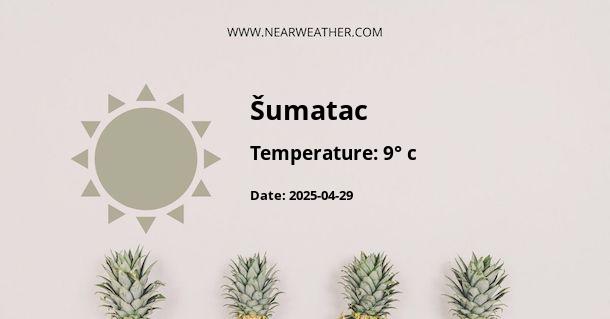Climate and Weather in Sumatac, Bosnia and Herzegovina
Bosnia and Herzegovina is a country with a diverse climate, and Sumatac is no exception. Located within the geographical region of the Balkans, Sumatac experiences a mix of Mediterranean and Continental climates. The weather here is shaped by several factors, including its latitude, altitude, and proximity to the Adriatic Sea.
Seasonal Weather Patterns in Sumatac
The climate in Sumatac can be characterized by four distinct seasons: a cold and snowy winter, a pleasant and blossoming spring, a warm and occasionally hot summer, and a moist and mild autumn. Below, we'll discuss the year-round climate and weather conditions you can expect in Sumatac.
Winter
Winter in Sumatac typically spans from December to February. Residents experience cold temperatures, sometimes dipping below 0°C. Snowfall is common, especially at higher altitudes, and can be heavy at times.
Spring
Spring, from March to May, witnesses a gradual transition with temperatures climbing steadily. Precipitation remains, with occasional rain showers nurturing the lush green landscape for which Bosnia and Herzegovina is known.
Summer
June to August covers the summer months in Sumatac, when temperatures can soar above 30°C. However, due to the altitude, nights remain cool. This period experiences the highest tourist traffic owing to favorable weather conditions.
Autumn
Autumn, which lasts from September to November, is marked by a gradual cooling. The weather remains mild at the beginning, with increasing rainfall towards the end of the season, as the region prepares for winter.
Temperature and Precipitation Averages
Detailed statistics on temperature and precipitation provide a more complete picture of Sumatac's climate. The weather is significantly influenced by both Mediterranean and Continental air masses, leading to variations in these averages.
Temperature Averages
| Month | Average High (°C) | Average Low (°C) |
|---|---|---|
| January | 3 | -3 |
| February | 6 | -1 |
| March | 10 | 2 |
| April | 15 | 6 |
| May | 20 | 11 |
| June | 24 | 14 |
| July | 27 | 16 |
| August | 27 | 16 |
| September | 22 | 12 |
| October | 16 | 8 |
| November | 10 | 3 |
| December | 5 | -1 |
Precipitation Averages
| Month | Average Precipitation (mm) |
|---|---|
| January | 62 |
| February | 57 |
| March | 62 |
| April | 68 |
| May | 78 |
| June | 75 |
| July | 68 |
| August | 70 |
| September | 72 |
| October | 77 |
| November | 85 |
| December | 80 |
Extreme Weather and Climate Events
Climate change has led to an increase in frequency and intensity of extreme weather events worldwide, and Sumatac is no exception. The region has observed some changes indicative of this pattern.
- Increased Frequency of Extreme Heat: Summer temperatures have been noted to rise above historical averages, leading to more frequent heatwaves that can impact health, agriculture, and water resources.
- Severe Storms: With higher temperatures comes the potential for more severe thunderstorms, which can lead to flash flooding and other damaging consequences.
- Longer Drought Periods: Prolonged periods of low precipitation have been recorded in Sumatac, potentially affecting local water supplies and agriculture.
- Heavy Snowfall: While winters are cold, there has been a trend towards extreme snowfall events that can disrupt transportation and infrastructure.
Adaptation and Preparedness for Changing Climate in Sumatac
To mitigate the effects of a changing climate, Sumatac has had to adapt in various ways. Strategies include improving infrastructure to withstand extreme weather, implementing early warning systems, and fostering sustainable practices to reduce long-term climate impacts.
Infrastructural Improvements
Upgraded drainage systems have become a priority to prevent flooding during heavy rainfall periods. Also, buildings are being designed or retrofitted to maintain their integrity during high temperatures or severe snowfall.
Agricultural Adaptation
Agricultural practices are evolving with a focus on drought-resistant crops and water conservation techniques. The timing of plantings and harvesting are adjusted to better align with the shifting climate patterns.
Community Awareness and Preparedness
Local authorities in Sumatac work to educate the community on emergency preparedness. Residents are informed about how to respond to heatwaves, floods, or other climate-induced emergencies.
Conclusion
Understanding the climate and weather year-round in Sumatac, Bosnia and Herzegovina, helps residents and visitors prepare and adapt to the seasons. While the area enjoys a rich mix of Mediterranean and Continental climates, it is not immune to the consequences of climate change. Efforts to adapt to and mitigate the effects of extreme weather events will ensure that Sumatac remains a resilient and thriving community in the face of global climate challenges.
Note: The information presented is based on historical data and may not represent the most current trends. Climate data can vary annually and this content is meant to provide a snapshot of Sumatac's typical climate patterns.
A - Šumatac's Latitude is 45.098888 & Longitude is 15.857500.
A - Weather in Šumatac is 9° today.
A - Climate Conditions in Šumatac shows few clouds today.
A - Humidity in Šumatac is 92% today.
A - Wind speed in Šumatac is 3.74 km/h, flowing at 287° wind direction. today.
